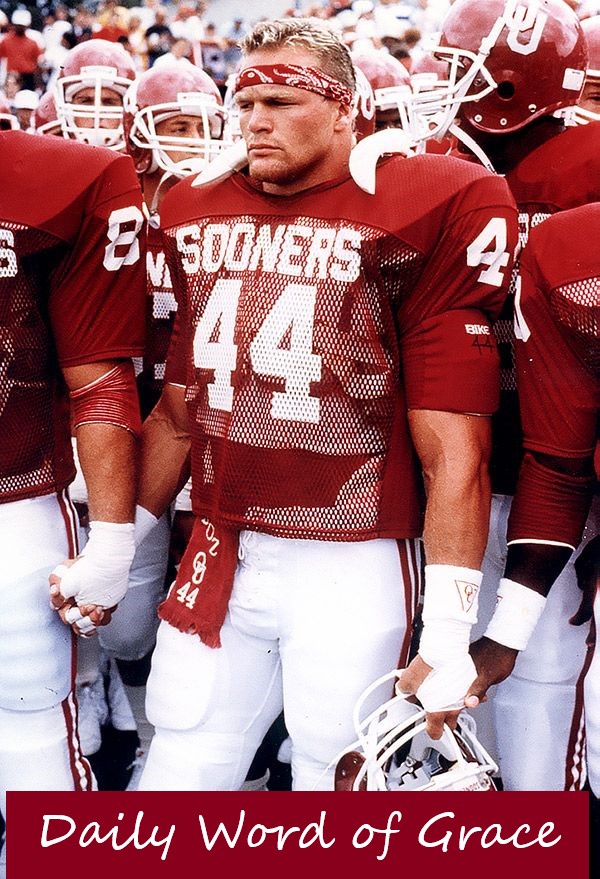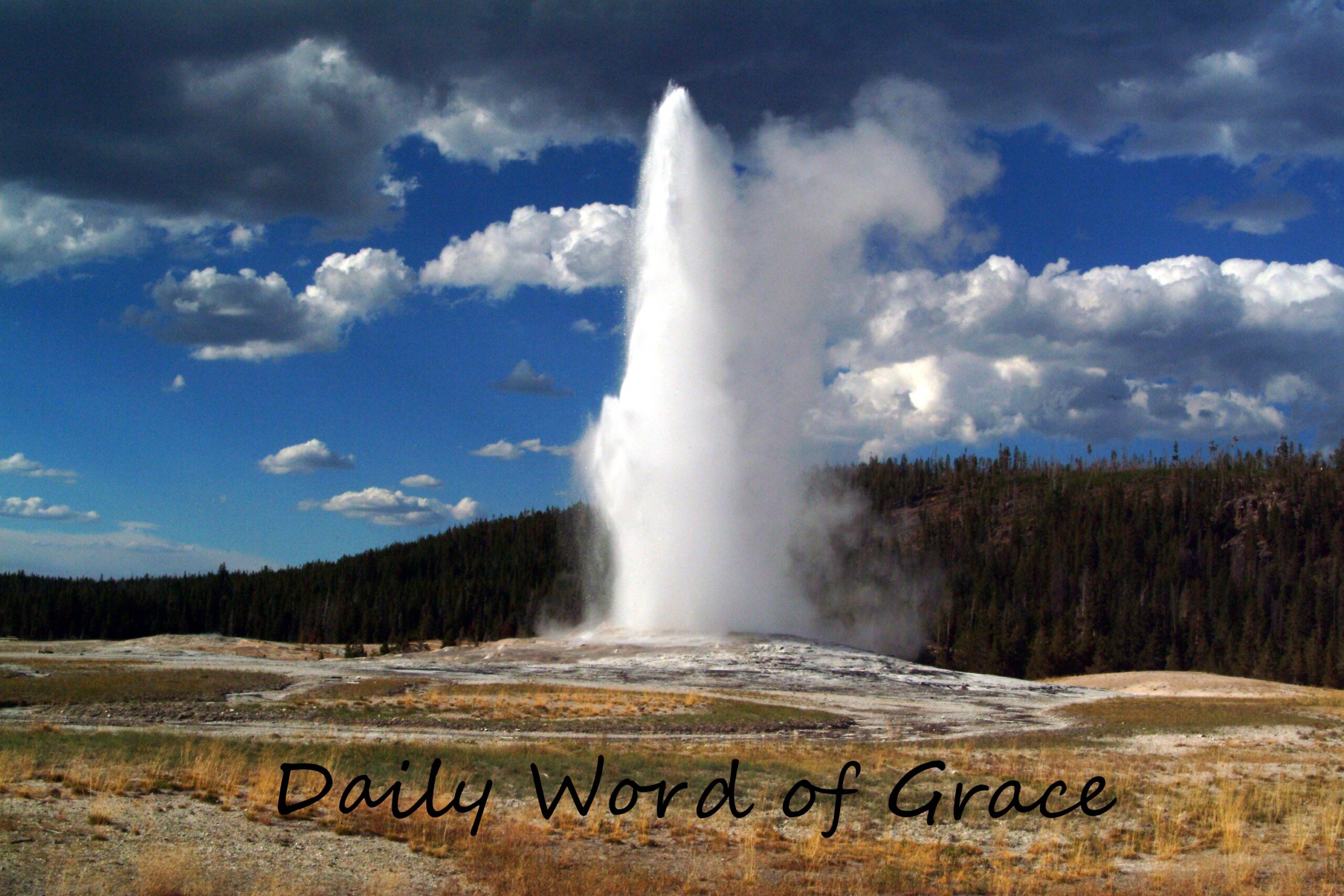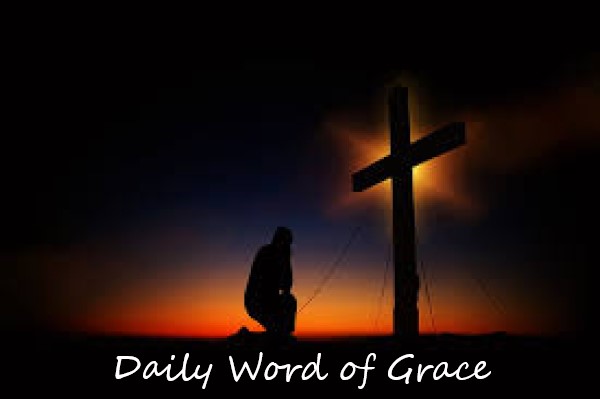Daily Word of Grace for November. Current postings of Daily Word of Grace can be found at the upper level of the page. Here is a link to see the current postings.

Daily Word of Grace # 185 (November 30, 2020)
During this liturgical season of Advent the daylight lessens every day (at least in the northern hemisphere) which of course means we experience a daily increasing time of darkness. For those who struggle with seasonal affective disorder or depression this time of the year can be daunting. The external darkness that can be overwhelming for some, and for others it is matched or surpassed by internal darkness. This is not uncommon for Christians any less than anyone else. The renown 16th century Spanish Catholic priest and mystic St. John of the Cross (1542 -1591) addressed this at length in his literary masterpiece Dark Night of the Soul, in which he describes how God uses these times to deepen our faith: “Into this dark night souls begin to enter when God draws them forth…to the end that we may the better understand and explain what night is this through which the soul passes, and…in order that, realizing the weakness of the state wherein they are, they may take courage, and may desire that God will bring them into this night, wherein the soul is strengthened and confirmed in the virtues, and made ready for the inestimable delight of the love of God.” In other words, God often works through such dark nights of the soul in order to deepen our trust in and reliance upon God’s love—for as a different St. John wrote in his account of the gospel, “The light shines in the darkness, and the darkness did not overcome it” (John 1:5).
Love and Prayers,
Dave
Daily Word of Grace # 184 (November 27, 2020)
The final song of the epic 1973 double rock opera album Quadrophenia by The Who is a prayer sung from the protagonist Jimmy—a disillusioned young man who feels disconnected from his parents, misunderstood by his psychiatrist, and overlooked by people all day long in his job as a bell boy. Even his girlfriend has walked away, with his best friend no less. Jimmy finally goes out to a rock in the sea near Brighton Beach, and calls out, “Only love can bring the rain that makes you yearn to the sky. Only love can bring the rain that falls like tears from on high. Love, reign o’er me, rain on me, rain on me…On the dry and dusty road the nights we spend apart alone I need to get back home to cool, cool rain. I can’t sleep and I lay and I think the night is hot and black as ink. Oh God, I need a drink of cool, cool rain. Love, reign o’er me, rain on me, on me, on me.” Of course Jimmy is neither alone in being disconnected, misunderstood, overlooked nor alone in experiencing the heartbreak of having a loved one walk away. Jesus understands and empathizes with all of that. The night before his suffering and death all his disciples walked away. Throughout his earthly ministry he was overlooked and misunderstood. And even on the cross he felt disconnected from God. And yet, out of love Jesus died for all of us, and the Risen Jesus remains the King of kings and Lord of lords (Revelation 19:16) whose love reigns o’er the universe, and whose love reigns o’er you. Today may you experience anew the “cool, cool rain” of the love of God.
Love and Prayers,
Dave


Daily Word of Grace # 183 (November 26, 2020)
In scripture we often read about the importance of giving thanks to God. “Enter his gates with thanksgiving,” the psalmist exhorts, “and his courts with praise” (Psalm 100:4). Similarly The Apostle Paul urged the Thessalonians, “Give thanks in all circumstances; for this is the will of God in Christ Jesus for you” (1 Thessalonians 5:18) and more succinctly to the church at Colossae, “And be thankful” (Colossians 3:15). And yet, thankful people tend to be greatly outnumbered by entitled people, as when only one of ten lepers healed by Jesus returned and “prostrated himself at Jesus’ feet and thanked him” (Luke 17:12-16). While it is a cliché, we indeed have so much for which to be thankful, for even every heartbeat and every breath is ultimately a gift from God, the Giver of “every perfect gift” (James 1:17). Along these lines a particularly beautiful and comprehensive expression of thanks to God is found in “The General Thanksgiving” in The Book of Common Prayer: “Almighty God, Father of all mercies, we your unworthy servants give you humble thanks for all your goodness and loving kindness to us and to all whom you have made. We bless you for our creation, preservation, and all the blessings of this life; but above all for your immeasurable love in the redemption of the world by our Lord Jesus Christ; for the means of grace, and for the hope of glory” (101). Thankfully, the Holy Spirit God uses this “means of grace” to transform our entitled hearts into thankful hearts.
Love and Prayers,
Dave
Daily Word of Grace # 182 (November 25, 2020)
In the back of The Book of Common Prayer are the “Articles of Religion” (aka “The Thirty-nine Articles”)—a succinct distillation of the doctrine of the Church of England. Article VI, “Of the Sufficiency of the Holy Scriptures for Salvation”, states “Holy Scripture containeth all things necessary to salvation: so that whatsoever is not read therein, nor may be proved thereby, is not to be required of any man, that it should be believed as an article of the Faith, or be thought requisite or necessary to salvation” (868). This is rooted in the Apostle Paul encouraging his protégé Timothy, “Continue in what you have learned and firmly believed…and how from childhood you have known the sacred writings that are able to instruct you for salvation through faith in Jesus Christ” (2 Timothy 3:15). In other words, while scripture is indeed “inspired by God” (2 Timothy 3:16; 2 Peter 1:20-21) it is not an end in and of itself, but a means to an end: salvation through faith in Jesus Christ. In an often overlooked passage Jesus urged, “You search the scriptures because you think that in them you have eternal life; and it is they that testify on my behalf. Yet you refuse to come to me to have life” (John 5:39-40). Similarly near the end of the Gospel According to John the evangelist writes, “These are written so that you may come to believe that Jesus is the Messiah, the Son of God, and that through believing you may have life in his name” (John 20:31). This salvation in Jesus Christ is available to you at this very moment.
Love and Prayers,
Dave


Daily Word of Grace # 181 (November 24, 2020)
In his famous harrowing debut novel Lord of the Flies (1954) William Golding vividly portrays the darkness of the human heart. British schoolboys survive a plane wreck leaving them on a desert island in the Pacific with no adults. They do their best to establish some sort of societal order among themselves but it all quickly devolves into fear, violence, murder, and destruction. At the end of the novel one of the main protagonists, Ralph, is being pursued to the death by the others and runs into the ocean only to find himself, and the others too, rescued by officers of a Royal Navy cruiser. Golding recounts what happened in that moment: “The tears began to flow and sobs shook him. He gave himself up to them now for the first time on the island; great, shuddering spasms of grief that seemed to wrench his whole body. His voice rose under the black smoke before the burning wreckage of the island; and infected by that emotion, the other little boys began to shake and sob too. And in the middle of them, with filthy body, matted hair, and unwiped nose, Ralph wept for the end of innocence, the darkness of man’s heart.” The bad news is our hearts are just as dark as those of the boys in this novel. The good news is that, just like the officers did for those boys, God “has rescued us from the power of darkness and transferred us into the kingdom of his beloved Son” (Colossians 1:13)…and God can even create in us new hearts (Psalm 51:10).
Love and Prayers,
Dave
Daily Word of Grace # 180 (November 23, 2020)
In his 1952 book Mere Christianity C. S. Lewis famously argues that when it comes to one’s perspective on Jesus being the Son of God there are three options: Liar, Lunatic, or Lord. In other words, Jesus claimed to be the Son of God but knew he was not, which makes him a liar; or Jesus claimed to be the Son of God and—believed he was—but in reality was not, which makes him a lunatic; or Jesus claimed to be the Son of God because he is, which makes him Lord. Lewis then writes, “You must make your choice. Either this man was, and is, the Son of God: or else a madman or something worse. You can shut Him up for a fool, you can spit at Him and kill Him as a demon; or you can fall at His feet and call Him Lord and God. But let us not come with any patronizing nonsense about His being a great human teacher. He has not left that open to us. He did not intend to.” Such apologetic arguments are powerful, and yet for some people still fall short of being convincing. This was the case with the disciple Thomas who even after being an eyewitness of Jesus’ earthly ministry still doubted his resurrection. But when the Risen Jesus appeared to his disciples again, and showed Thomas the scars that proved God’s love for him—a love stronger than his doubt—Thomas responded just as C. S. Lewis wrote in the above passage, and said, “My Lord and my God!” (John 20:24-28). Ultimately it is the love of God that demonstrates Jesus’ identity as Lord.
Love and Prayers,
Dave


Daily Word of Grace # 179 (November 20, 2020)
When my son Paul was young we spent many hours at a local batting cage. I pitched bucket after bucket of baseballs to him and over the years he grew taller and stronger and became a very powerful hitter. Those are some of my favorite memories. Along these lines, I came across a recent post on social media where an elderly man left a bucket of baseballs at a local batting cage with this note taped to it: “Hope someone can use some of these baseballs in the batting cages. I found them cleaning out my garage. I pitched them to my son and grandson for countless rounds. My son is now 46 and my grandson is 23. I am 72 and what I wouldn’t give to pitch a couple buckets to them but they have both moved away. If you are a father cherish these times, you won’t believe how quickly they will be gone. God bless. PS: Give them a hug and tell them you love them every chance you get.” He is right, those times do go by so quickly and are soon gone. And yet the love of God for you—not just corporately but individually, the love of God for you—never goes away and is never gone, but lasts forever. In response to God’s amazing love we are called to love others: “We know love by this, that Jesus laid down his life for us—and we ought to lay down our lives for one another” (1 John 3:16). And yes, this may very well include giving them a hug and telling them you love them every chance you get.
Love and Prayers,
Dave
Daily Word of Grace # 178 (November 19, 2020)
One of my favorite songs by the incomparable Joni Mitchell is her 1969 gem “Both Sides Now” from her album Clouds. She picturesquely describes seeing love from “both sides now”: “Moons and Junes and Ferris wheels, the dizzy dancing way you feel as every fairy tale comes real. I’ve looked at love that way. But now it’s just another show, and you leave ‘em laughing when you go. And if you care, don’t let them know, don’t give yourself away. I’ve looked at love from both sides now, from give and take and still somehow it’s love’s illusions I recall. I really don’t know love at all.” So insightful, so relatable. On one side of love you experience the rapture of “the dizzy dancing way you feel as every fairy tale comes real”—but on the other side of love you experience the disillusion that can lead to “if you care, don’t let them know, don’t give yourself away.” God’s love encompasses and transcends both sides of every experience of love in your life. Although Jesus knew what awaited him on Good Friday, that did not prevent him from letting the world know—including you—and giving himself away on the cross (John 3:16). God has always been there with you on both sides of love. Even after you die you will experience the eternal rapture of the eternal love of God, marked by “the dizzy dancing way that you feel as every fairy tale comes real” because the gospel is no fairy tale at all.
Love and Prayers,
Dave


Daily Word of Grace # 177 (November 18, 2020)
An especially powerful prayer in The Book of Common Prayer is this prayer for healing: “I lay my hands upon you in the Name of our Lord and Savior Jesus Christ, beseeching him to uphold you and fill you with his grace, that you may know the healing power of his love. Amen” (456). One of the innumerable benefits of God’s love is healing—healing the wounds in your heart that are there (and may have been there a very long time), healing the wounds inflicted on you by others, healing the wounds inflicted on you by yourself, healing the wounds that you never talk about, healing the wounds you thought you had finally gotten over until something reminds you that no, you have not gotten over it at all. The Old Testament prophet Malachi prophesied, “The sun of righteousness shall rise, with healing in its wings” (Malachi 4:2). That “sun of righteousness” is Jesus Christ, the Son of God, the Son of Righteousness. Through the wounds inflicted on Jesus on Good Friday, scripture assures you that you have been and will be healed (Isaiah 53:5 and 1 Peter 2:24). The Risen Jesus indeed has “the name that is above every name” (Philippians 2:9), and scripture assures us, “everyone who calls on the name of the Lord shall be saved” (Acts 2:21). As indicated in the above prayer, it is the grace of God (and only the grace of God) that can “uphold you and fill you” with God’s healing love—and that grace is available to you even now.
Love and Prayers,
Dave
Daily Word of Grace # 176 (November 17, 2020)
An episode of ESPN’s fascinating documentary series 30 for 30—“Brian and the Boz”—focused on the life and career of Brian Bosworth, aka “The Boz,” a superstar college linebacker who played for the Oklahoma Sooners in the 1980’s. In high school, although externally Brian came across as an arrogant standout football player, internally this was not the case: “When I was in high school I had some serious doubt issues as to my ability as a football player and I played scared.” The reason Brian Bosworth “played scared” was the lack of approval given by his father. Brian goes on to say, “When it came to sports it was never good enough, I didn’t play well enough.” Brian’s sister concurred, “He’d get done with a practice or a game and there was just a harpooning at the end of that as to everything that could have/should have been done differently.” Near the end of the documentary Brian and his son are flipping through a scrapbook of his acclaimed football career, and Brian says, “There’s more to life than paper clippings and accolades and rewards”—and then as he closes it, he concludes, “let’s put this stuff away.” When it comes to your Heavenly Father scripture says this: “See what love the Father has given us, that we should be called children of God; and that is what we are” (1 John 3:1). God’s love transcends any doubts about yourself you may have as well as anything in your life you could have or should have done differently…and God’s love means you never have to play scared.
Love and Prayers,
Dave


Daily Word of Grace # 175 (November 16, 2020)
Several years ago I was at the middle school graduation for one of our kids. There was the endless stream of awards for every conceivable academic subject and activity, even perfect attendance. There was the painful performance of the middle school band (God bless middle school band teachers), and the ego-filled speeches from the top graduates. Finally, the graduation certificates were given. Each eighth grade graduate ascended the stairs, walked across the stage to receive their certificate—often flashing a braces-filled smile as they did so—and descended the stairs on the far side of the stage. One graduate was wheelchair bound. He had not received a single award—and due to severe challenges to which none of us could relate, he could have never won a perfect attendance award. His father wheeled him to the stage. There was an awkward moment as the father could not wedge the wheel chair up the narrow stairs, but then something very moving happened. The father simply scooped up his son into his arms and gently carried him across the stage to receive his graduation certificate—and yes, this young man also flashed a braces-filled smile for all to see. Appropriately he received the loudest applause of all. That is what God’s love for you looks like. Like a shepherd gently carrying a lamb (Isaiah 40:11), God will carry you all through your life, even to “graduation” and into eternity.
Love and Prayers,
Dave
Daily Word of Grace # 174 (November 13, 2020)
In the fall of 1995 my young family lived in Sheridan, Wyoming. On a beautiful late September day we drove west nearly four hours to Yellowstone National Park. We stopped at the big entrance sign and took a photo, and then excitedly drove to into the park….only to learn at the gate that the park was closed that day. We turned around and headed home, although we stopped for a wonderful picnic in Cody. Eight months later in May, 1996 we drove there again, and thankfully it was open. The most famous of the nearly 500 geysers at Yellowstone is Old Faithful, which erupts every hour or two. We saw Old Faithful erupt and it was amazing. Scripture assures us that “God is faithful” (1 Corinthians 1:9), which is good news because people are often fickle. On Good Friday God’s faithful love erupted when Jesus died on the cross for our sins and afterwards a soldier pierced his side and “at once blood and water came out” (John 19:34). Along these lines the poet and hymnodist William Cowper (1731 – 1800) wrote: “There is a fountain filled with blood drawn from Emmanuel’s veins; And sinners, plunged beneath that flood, lose all their guilty stains.” Yes, this is graphic imagery, but our sins are even more graphic. Thankfully the gospel assures us that the blood of Jesus is enough to “cleanse us from all unrighteousness” (1 John 1:9). God’s faithful love never changes…and the park where you can freely receive God’s forgiveness is always open.
Love and Prayers,
Dave


Daily Word of Grace # 173 (November 12, 2020)
One of the most popular British rock bands of the 90’s was The Verve. Their biggest hit was their Grammy-nominated 1997 smash “Bitter Sweet Symphony” in which lead singer Richard Ashcroft sings, “It’s a bittersweet symphony this life. Trying to make ends meet, you’re a slave to the money then you die.” Later in the song he confesses, “Well I never pray, but tonight I’m on my knees. I need to hear some sounds that recognize the pain in me.” In scripture the writer of Ecclesiastes similarly observes, “Vanity of vanities, says the Teacher, vanity of vanities! All is vanity. What do people gain from all the toil at which they toil under the son?” (Ecclesiastes 1:2-3). For many people, the sense that life is indeed a “bitter sweet symphony” and that “all is vanity” can be so overwhelming that it can drive even those who never pray to their knees. Each of us needs “to hear some sounds that recognize the pain in me.” And that is exactly where the grace of our Savior Jesus Christ, our Great High Priest who always recognizes the pain in us, appears: “For we do not have a high priest who is unable to sympathize with our weaknesses, but we have one who in every respect has been tested as we are, yet without sin. Let us therefore approach the throne of grace with boldness, so that we may receive mercy and find grace to help in time of need” (Hebrews 4:15-16). The grace of Jesus Christ transforms a bitter sweet symphony into a sweet one—and transforms a heart overwhelmed by vanity into a heart overflowing with praise.
Love and Prayers,
Dave
Daily Word of Grace # 172 (November 11, 2020)
One of the greatest basketball coaches ever was the legendary John Wooden (1910 – 2010), who died when he was ninety-nine. He coached the UCLA Bruins to ten NCAA championships in twelve seasons, including a record seven years in a row (1967 – 1973). His nickname was “The Wizard of Westwood” and he was almost as famous for his witticisms as he was his coaching record. Among his best known sayings include: “Nothing will work unless you do” and “Things turn out best for the people who make the best of the way things turn out.” In an interview shortly after Wooden’s death, hall of famer Bill Walton, who played for Wooden at UCLA, recounted his favorite saying of the late coach, “It’s what you learn after you know it all that counts.” When it comes to the gospel, you may think you already know it all—that yes, God loves you and yes, Jesus died on the cross for you, and yes, God’s love never ends…but the measureless scope and eternal magnitude of God’s love is so vast it is ever-growing and ever-new. Along these lines the Apostle Paul wrote that he prayed you would “know the love of Christ that surpasses knowledge” (Ephesians 3:19). When it comes to the God’s love, you will be reminded of the truth of “It’s what you learn after you know it all that counts” again and again repeatedly throughout eternity.
Love and Prayers,
Dave


Daily Word of Grace # 171 (November 10, 2020)
A particularly powerful collect (brief, theologically loaded prayer) in The Book of Common Prayer is this one: “Grant us, Lord, not to be anxious about earthly things, but to love things heavenly; and even now, while we are placed among things that are passing away, to hold fast to those that shall endure; through Jesus Christ our Lord, who lives and reigns with you and the Holy Spirit, one God forever and ever. Amen” (234). We are living in a time when both individually and societally there is much anxiety about “earthly things”—and understandably so given the pandemic, social unrest, political polarization, and economic volubility—so this collect is particularly timely. And yet we are still assured that although all these things are very important, they are also “things that are passing away”—and we are still called “to hold fast to those that shall endure.” Similarly we read in scripture, “Do not worry about anything, but in everything by prayer and supplication with thanksgiving let your requests be made known to God. And the peace of God, which surpasses all understanding, will guard your hearts and your minds in Christ Jesus” (Philippians 4:6-7). And it is only through the grace of God we are able to do this. In other words, we are only able “to hold fast to those that shall endure” and experience “the peace of God, which surpasses all understanding” because God is holding onto us.
Love and Prayers,
Dave
Daily Word of Grace # 170 (November 9, 2020)
A particularly fascinating book written by the “Father of the National Parks”, John Muir (1838-1914), is The Yosemite (1912), in which he describes “riding” an avalanche: “The wallowing ascent had taken nearly all day, the descent only about a minute. When the avalanche started I threw myself on my back and spread my arms to try to keep from sinking…and as the whole mass beneath and about me joined in the flight there was no friction, though I was tossed here and there and lurched from side to side. When the avalanche came to rest I found myself on top of the crumpled pile without a bruise or scar” (66). You may experience a metaphorical avalanche in your life in which the ascent took a long time—perhaps a personal relationship or work promotion or financial goal—only to be eclipsed by a descent caused by an avalanche that only takes a minute. Muir shows us the best thing to do when this happens: throw ourselves on our back and spread our arms—in other words, surrender to God’s grace and commend the whole situation to God. The psalmist put it this way, “Into your hand I commit my spirit; you have redeemed me, O Lord…I trust in you, O Lord; and I say, ‘You are my God.’ My times are in your hand” (Psalm 31:5, 14-15). When the avalanche of Good Friday overtook Jesus, that is exactly what he did as he suffered with spread out arms and prayed, “Father, into your hands I commend my spirit” (Luke 23:46).
Love and Prayers,
Dave


Daily Word of Grace # 169 (November 6, 2020)
An often overlooked brilliant singer-songwriter is Kris Kristofferson, who wrote “Me and Bobby McGee” (one of Janis Joplin’s most famous hits), “Sunday Morning Comin’ Down” (a hit for Johnny Cash) and many others. In addition to being a songwriter he has been a Rhodes Scholar, an Army Ranger, and an accomplished actor. And yet late in his life, in spite of all his accomplishments and acclaim, he wrote a beautiful prayer of a song called “Why Me?” in which he asks: “Why me Lord? What have I ever done to deserve even one of the pleasures I’ve known. Tell me Lord, what did I ever do that was worth the kindness you’ve shown? Lord help me. Jesus, I’ve wasted it so. Help me, Jesus, I know what I am. Now that I know that I need you so. Help me, Jesus, my soul’s in your hand.” You and I will probably never be as accomplished as Kris Kristofferson, but we can certainly ask the same questions, “Why me, Lord?“ The answer to that “why” is because the Lord loves us all more than we can imagine with unconditional love that always gives more than anyone deserves. None of us is deserving of the kindness God has shown us all in Jesus Christ and yet the Lord has given, continues to give, and will forever give us that undeserved kindness (Titus 3:4-5). “Why me?” Because God remains “the God of all grace” (1 Peter 5:10).
Love and Prayers,
Dave
Daily Word of Grace # 168 (November 5, 2020)
One of the most powerful moments of grace I ever experienced happened in my 8th grade Latin class. As we were conjugating verbs one day I was completely checked out, writing a gushing love letter (in the dark ages we did not have cell phones to text with) to the gorgeous brunette who sat in front of me. The muses were flowing and I wrote and wrote…until to my horror I realized our Latin teacher was standing right next to me (I only noticed because there was loud laughter from the rest of the class…apparently he had been standing there for some time). His hand was outstretched, “Give me the note please.” I turned purple with embarrassment not only because I was caught but also because his policy was to read aloud to the class any note he caught someone writing. I braced for it…but to my stunned relief he read it silently to himself, folded it up and put it in his pocket. “Please pay attention, Dave” was all he said. That was it. I was SO relieved, I would have conjugated a thousand verbs for him. Scripture tells us that “love covers a multitude of sins” (1 Peter 4:8). Thankfully, that is exactly what God does for us, even at the cost of the blood of Jesus Christ. In other words, rather than embarrassing us with our sins in front of others, God simply folds them up, puts them in his pocket, and asks us to pay attention—which means the gospel of God’s forgiving love is always a word of relief.
Love and Prayers,
Dave


Daily Word of Grace # 167 (November 4, 2020)
The Apostle Paul, who penned thirteen of the epistles in the New Testament is arguably the most influential person, outside of Jesus Christ of course, in the history of Christianity. And yet many of his contemporaries considered him a second class apostle, for a couple reasons. First, unlike other apostles like Peter and John, Paul had not been an eyewitness of Jesus’ earthly life and ministry but rather had converted as a result of his encounter with the Risen Jesus on the road to Damascus (Acts 9)—and therefore considered a “Johnny come lately.” Second, prior to his conversion, Paul had actually taken part in persecuting the Christian church, as he later wrote, “I was formerly a blasphemer, a persecutor, and a man of violence” (1 Timothy 1:13). And yet, there was something infinitely more important than both of these: God’s grace in Jesus Christ—as Paul put it, “the grace of our Lord overflowed for me” (1 Timothy 1:14) and “by the grace of God I am what I am, and his grace toward me has not been in vain” (1 Corinthians 15:10). What was true of Paul is true for you. God’s grace is infinitely more important than any lack you may have, as well as your past. The Body of Christ consists of redeemed sinners, and because of God’s grace, there is no such thing as a second class apostle or a second class saint.
Love and Prayers,
Dave
Daily Word of Grace # 166 (November 3, 2020)
In his 2009 book Have a Little Faith Mitch Albom recounts conversations he had with various religious leaders, including a rabbi, Albert Lewis (affectionately known as “Reb). In one of these conversations Rabbi Lewis told Mitch, “’You know, in our tradition, we ask forgiveness from everyone—even casual acquaintances. But with those we are closest with—wives, children, parents—we too often let things linger. Don’t wait, Mitch. It’s such a waste.’ He told me a story. A man buried his wife. At the gravesite he stood by the Reb, tears falling down his face. ‘I loved her,’ he whispered. The Reb nodded. ‘I mean…I really loved her.’ The man broke down. ‘And…I almost told her once.’ The Reb looked at me sadly. ‘Nothing haunts like the things we don’t say’” (212). In my life there are three things that I have omitted saying that have later haunted me: 1) Thank you, 2) I’m sorry, and 3) I love you. Yes, “nothing haunts like the things we don’t say”…but healing comes when we do say those things, especially “I love you”—always. Not only is this true in our relationships with other people, it is also true in our relationship with God, whose love invokes within us gratitude (“Thank you”—1 Thessalonians 5:18), repentance (“I’m sorry”—Romans 2:4), and love (“I love you”—1 John 4:19). So…say it, say it, say it.
Love and Prayers,
Dave


Daily Word of Grace # 165 (November 2, 2020)
In his early fifties the great Anglican priest and poet John Donne (1572-1631) suffered what he fully expected to be a terminal illness. During his illness he wrote Devotions upon Emergent Occasions (1624). In describing relapses in sin and/or sickness he observes, “It adds to the affliction, that relapses are (and for the most part justly) imputed to ourselves, as occasioned by some disorder in us; and so we are not only passive but active in our own ruin; we do not only stand under a falling house, but pull it down upon us; and we are not only executed (that implies guiltiness), but we are executioners (that implies dishonor), and executioners of ourselves (and that implies impiety) (146).” That’s the bad news. What do we do with that? Donne does the only thing we can do: prays for God’s mercy—“But because, by too lamentable experience, I know how slippery my customs of sin have made my ways of sin, I presume to add to this petition too, that if my infirmity overtake me, thou forsake me not” (152). God is a God of mercy, and on Good Friday Jesus took the weight of the falling houses in our lives upon himself, and was executed in our place on the cross. In other words, God answered that prayer for John Donne, for he survived that illness and lived until 1631—and God will answer that prayer for you too, because the Lord promises, “I will never leave you or forsake you” (Hebrews 13:5).
Love and Prayers,
Dave